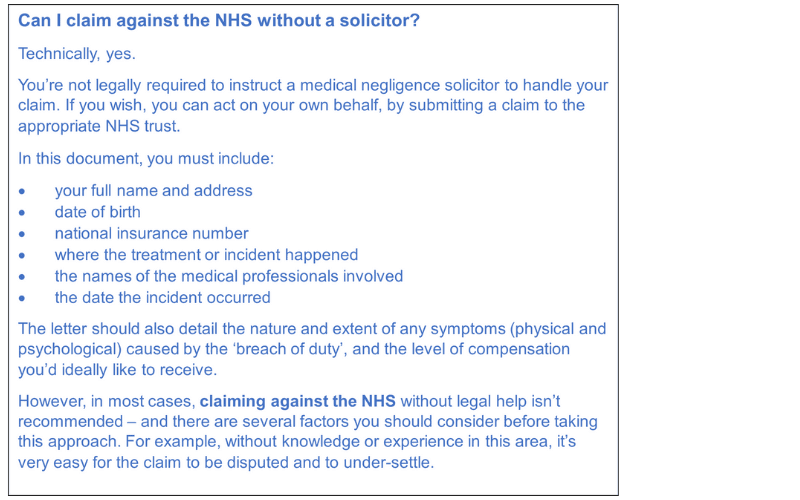Generally speaking, the NHS does an excellent job – and most people don’t have any issues.
But things can, and sometimes do, go wrong.
Medical professionals are only human, and mistakes happen. Which means, unfortunately, there are times when the care received falls below the expected standard. And if you’ve suffered – physically, psychologically, or financially – as a result, you might end up wondering how to claim against the NHS.
Here at Injury Lawyers Direct, we have a team of knowledgeable and experienced medical negligence solicitors, who are hand and ready to help. Read on to familiarise yourself with the process and, to start your claim against the NHS, get in touch today.
5 steps to claim against the NHS for negligence
Step 1 – Establish whether NHS negligence occurred
NHS negligence isn’t just about a negative health outcome. It’s about a negative health outcome that could have been avoided – if the correct protocols and safeguards had been followed.
To claim against the NHS for compensation, you’ll need to show that:
- the NHS owed you a duty of care
- they acted in breach of that duty of care
- this breach directly caused you harm or suffering
Organisations with this ‘duty of care’ include hospitals, GP practices, and independent organisations carrying out NHS services. And ‘breaches’ can include everything from medication and laboratory mistakes (e.g. false test results) to misdiagnosis, delayed treatments and irreversible surgical errors.
To find out whether your experience is classed as negligence, the best option is to contact our specialists for a consultation. With some basic information about your case, we can establish your eligibility to make an NHS negligence claim and also advise on your chances of success.
Step 2 – Make an official complaint
Whilst complaining about NHS services won’t lead to any compensation, the feedback will (hopefully) lead to a much-deserved apology – as well as improvements to the quality of care.
It can support your compensation claim, too, so is definitely worth doing.
It’s best to make a complaint in writing or by email within 12 months of the incident. This can either be made to the NHS service provider directly (e.g. GP surgery or hospital) or to the commissioner of the service (i.e. the body that pays for it).
Action Against Medical Accidents has a few examples of complaint letters, which demonstrate what you need to include. Just keep to the facts of your case – avoiding any emotional language – and simply explain who and what you’re complaining about and the result you’re hoping for.
An investigation will then be launched, and you’ll receive a full written response.
All health organisations have a legal duty to be open and honest. This is known as their ‘duty of candour’. So if something has gone wrong, by law this will need to be disclosed – and the response should set out the full findings of the investigation and what’s being done to address the issue.
Step 3: Recruit the help of NHS negligence solicitors
The next step is to seek legal guidance and representation.
NHS negligence solicitors – such as those in our team – may not be able to turn back time or restore your health. But as specialists in the field, they can (at the very least) make the claims process as quick and easy as possible, whilst also ensuring you get the maximum level of compensation.
Getting financial justice for your suffering is important, but not as important as your recovery.
So whilst you focus on your health, it makes sense to allow our solicitors to oversee legal proceedings. From proving fault to negotiating a fair settlement, we can take care of everything on your behalf – all on a completely ‘no win no fee’ basis. And with a strong history of successful claims against the NHS, you can rely on us to achieve the best possible outcome for your case.

Step 4 – Gather the evidence
When it comes to NHS medical negligence claims, evidence is vital.
For the claim to be successful, you will need to prove liability or fault on the part of the medical professional. As such, your solicitor will start by gathering any factual evidence that supports your claim – demonstrating that a ‘duty of care’ has been breached and you’ve suffered as a result.
Some of the most important pieces of evidence include:
- An expert’s opinion
Typically, the first step is to get an expert’s opinion on the circumstances of your case. Your solicitor will contact a specialist with detailed knowledge and experience in the area, and based on their opinion, will make a decision on whether liability can be proven.
- Medical notes
Your medical records will be reviewed, and any correspondence from the healthcare professional and/or healthcare setting (e.g. letters, notes relating to treatments etc.) will be collated.
- Witness statements
These can be taken from anyone present at the time of the incident. For example, if you attended appointments with a family member or friend, this could substantiate your claim.
- Medical examination
Depending on the nature of your symptoms, you may be asked to attend one or more medical examinations – allowing a medic to confirm the impact of those symptoms on your life.
Step 5: Send a letter of claim
Having gathered sufficient evidence, your medical negligence solicitor will then calculate how much compensation you should be paid – considering both the pain and suffering experienced (general damages), as well as any financial losses incurred as a direct result (special damages).
All of this information will then be sent to NHS Resolution.
From the point at which the ‘Letter of Claim’ is sent, the NHS will have 4 months to investigate the claim, obtain their own reports and confirm whether or not they accept liability for negligence.
If liability is accepted, a formal offer will be made, and mediation may be required to reach a final settlement. If liability is denied, court action may be required. However, it’s important to note, this is very rare – and your solicitor will always strive to achieve the best outcome in the easiest possible way.

Ready to start your NHS medical negligence claim?
Claiming against the NHS for negligence may feel like a daunting process, especially at such a difficult time of your life. Which is why, it’s worth having the expertise of a specialist NHS negligence solicitor on your side.
Here at Injury Lawyers Direct, we can advise on your eligibility, put together a successful NHS negligence claim that accurately reflects your circumstances, and ensure you receive an adequate level of compensation for the hurt and suffering experienced.
All you need to do is get in touch.
To arrange a free consultation with our NHS negligence solicitors, fill out our online form and we’ll respond to your enquiry as soon as possible. Alternatively, if you have any questions about how to claim against the NHS or the service we provide, please feel free to give us a call on 0800 110 5888.
We’re always on hand and happy to help.

